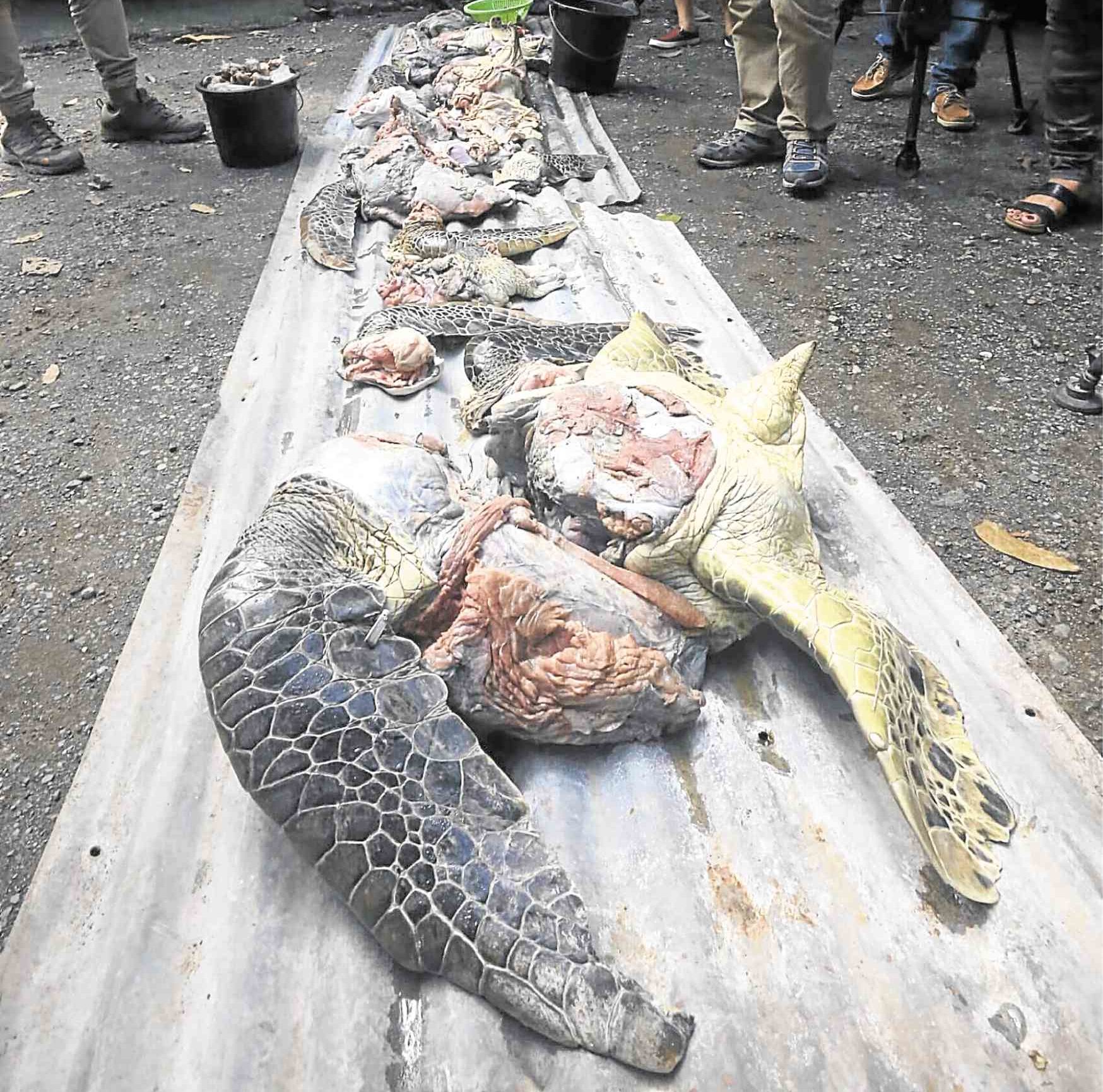Turtle rescued in Malaysia ends up at Cebu City eatery

TURTLE SLAUGHTER Chunks of meat from six endangered green sea turtles, five of them juveniles, are found by a government raiding team stored in a cooler at an eatery in Cebu City. —LITO TECSON/CEBU DAILY NEWS
CEBU CITY — An adult green sea turtle that had been rescued and tagged for conservation in Malaysia was no match to traders at Pasil fish market here, who butchered the marine creature along with other “pawikan” for their meat.
Agents of the Central Visayas regional offices of the National Bureau of Investigation and the Department of Environment and Natural Resources (DENR) and the Cebu City government confiscated on Tuesday about 60 kilograms of pawikan meat from an eatery on Rallos Street here.
“One of the pawikan was already rescued and rehabilitated in Malaysia. The tag came from Sandakan, Malaysia. This species is migratory so when it came to Cebu, it was captured and killed,” said Rogelio Demelletes Jr., DENR senior ecosystem management officer.
Illegal trade
The government team arrested five people during the operation—eatery cashier Donesa Bustamante, cook Cresley Obatay and helpers Ariesteo Pableo, Julio Abunta and Clifford Obatay.
Article continues after this advertisementThey refused to issue any statement to reporters or divulge to authorities their source of pawikan meat.
Article continues after this advertisementDemelletes said Cebu City, particularly Barangay Pasil, had been a known site for illegal trade of wildlife meat.
“It is common knowledge here that pawikan meat is sold in Pasil. It’s called ‘power.’ Even if you look at Google Earth, they have a map that points to Pasil with the [word] ‘power’ on it,” he said.
Pawikan meat prepared as the local dish “larang” can be bought at roadside eateries in Pasil by using the code “power,” a reference to the local belief that eating this exotic dish will improve sexual prowess.
“Power” is sold at the eatery for P90 per serving, expensive than the regular larang prepared from fish, which costs P75 per serving.
Those who buy or eat pawikan meat, he said, may also be held liable because “nobody will sell if there is no [buyer],” he said.
Rampant
According to lawyer Habeas Corpuz of the NBI environmental crime division, his group received an intelligence report about the rampant illegal wildlife trade in Pasil.
DENR and NBI agents conducted a “test buy” of raw pawikan meat over a month ago to verify reports that sea turtles were being used in dishes offered in the area.
“Normally, they do not sell raw meat. Luckily, our men were able to buy raw meat. We used that to subject the sample to a DNA sequencing test,” Corpuz said.
The test, conducted by researchers at the University of the Philippines Diliman, reported that the DNA of the sample meat bought in Pasil matched by “99.83 to 100 percent” with the DNA sequence of green sea turtles (Chelonia mydas).
He said the pawikan meat that the team seized from the eatery was stored in a cooler. The body parts showed that the meat came from five to six juveniles and an adult green sea turtle.
Finding supplier
“We want to identify where the supply is coming from because we want to cut this business from [the source],” Corpuz said.
Charges of multiple counts of possessing, trading and killing endangered species were filed against the suspects on Tuesday. These offenses are bailable.
Penalty for violating the law
DENR Undersecretary Benny Antiporda said under Republic Act No. 9147 (Wildlife Resources Conservation and Protection Act), trading of endangered animals or their byproducts is punishable with imprisonment and penalty.
Antiporda said under this provision, it is prohibited for anyone to collect, hunt or possess wildlife, their by-products and derivatives; gathering or destroying of active nests, nest trees, host plants and the like.
Antiporda clarified that the imposable penalty for such illegal acts are the following:
(a) imprisonment of two years and one day to four years and a fine of P30,000.00 to P300,000.00, if inflicted or undertaken against species listed as “critical” species;
(b) imprisonment of one year and one day to two years and a fine of P20,000.00 to P200,000.00, if inflicted or undertaken against “endangered” species;
(c) imprisonment of six months and one day to one year and a fine of P10,000.00 to P100,000.00, if inflicted or undertaken against “vulnerable” species;
The DENR spokesperson also added that the green sea turtle is categorized as “endangered” thus, it carries a penalty of one year and one day to two years imprisonment and a fine of P20,000 to P200,000.00.
The green sea turtle, according to the World Wildlife Fund (WWF), is one of the largest species of sea turtles, growing to 150-400 pounds, or up to 180 kg.
“Classified as endangered, green turtles are threatened by over harvesting of their eggs, hunting of adults, being caught in fishing gear and loss of nesting beach sites,” the WWF said on its website.